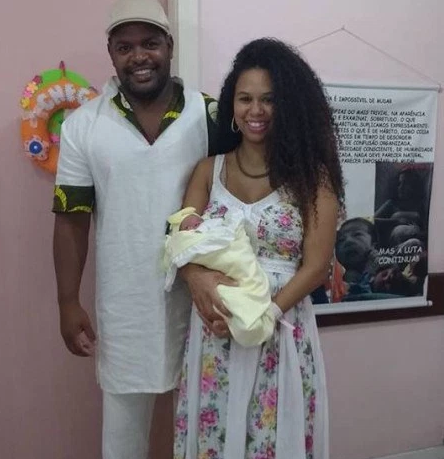
Black Women of Brazil
What would you do, and how would you feel, if you wanted to name your child something unique, something beautiful, and something that meant a lot to you, only for your name of choice to be rejected? And not because something was actually wrong with it, but because those in charge felt it was a name that would set your child up for failure?
That’s what has happened to the mother and father of a newborn in Rio, whose parents would like to name her Makeda Foluke. According to the site Black Women of Brazil, the name has a lot of meaning. Makeda is the name Ethiopians use when referring to the Queen of Sheba, and Foluke is a Yoruba (Nigerian) name. Together, they claim that it means “Grandiose that is at the care of God.”
“It’s not a name phonetically alien to Portuguese, we thought about it,” said the child’s father, Cizinho Afreeka according to the site R7. And while Afreeka and his wife were well aware that European names are preferred, considering that there are so many Brazilians from Africa living in the country, they never thought they’d actually be blocked.
“It’s a form of racism that takes place in Brazil: the racism of subtleties,” Afreeka said. “It should be very natural a man and a black woman adopting an African name, as the country is made up of three races. It is difficult to prove. Only those in this skin is knows.”
So what exactly happened?
After being born on March 16, the child’s moniker was not allowed to be placed on her birth certificate because it had not been approved by the 2nd district of São João de Meriti’s registration office. According to Afreeka and his wife, Jessica Juliana, they were told that the name would cause embarrassment for their daughter as she got older, and felt that the way to go would be to change up the name. You know, to something less African. This, despite Afreeka speaking to a civil registration official by telephone beforehand who said he didn’t mind the name, according to Black Women of Brazil. However, a petition still had to be filled out and filed.
“He said he thought the name was beautiful,” Afreeka said. “They already knew that the name was African. They searched the internet before giving a negative. I made a petition and took a statement from my wife authorizing, but it was denied. The notary suggested I put a name in Portuguese in front. But I will keep on until the end. Either it will be Makeda Foluke or she’ll be with no registration.”
That registration official, Luiz Fernando, is defending the registration office’s decision.
“The procedure is necessary with any name that can be used to leave the child in a vexatious situation or bullying. You have to filter. These procedures are normal, no one refused to do the registration. It is not the name, not the meaning. It’s pronunciation, diction. Racism is really in people’s minds.”
Again, officials didn’t mind the use of Makeda, but they suggested giving the child a traditional name before it. Like, Ana Maria Makeda.
The registration office shared their decision on the name with the Internal Affairs Division of the Court of Rio, who offered up this full response, brought to you by Black Women of Brazil:
The prosecutor’s office issued an opinion against the use of the name because they considered it likely to cause future problems for the child, suggesting a pre-name was added to the other names…such as Ana Maria Makeda or something like this.
If the judge does not authorize, it will be up to the party to appeal the decision in the procedure in the proper registry office that will be forward to the Council of the Magistracy.
When you pronounce the name in Portuguese it makes no sense at all, except for coming out wrong, which could provide possible future suffering for the person in social life.
The criterion is the analysis of the magistrate and prosecutors who act to protect the child. Law 6.015/ 73 gives this power to avoid registrations with names that may affect the social life. The criteria are the social and historical phonetics of Portuguese, verifying the sense that the name may have to be spoken or read, must meet in these criteria elements that can classify it as vexatious. Thus are considered vexatious historical names of bloodthirsty dictators or persecuted characters or execrated over time, the objectification of the name or the phonetic pronunciation, which seems to be the case, because it will not make any sense to those who do not know its origin and its translation, favoring acts as “bullying” or discrimination. Several cases where the lack of care of the registers and deeper analysis produced cases that later forced people to go to court to change the first names are notorious due to the embarrassment caused in childhood. One of the most famous was that of the daughters of Baby and Pepeu (1).
The request is being examined by the responsible judge, but it is an analysis at the administrative level that provides for its consideration on appeal to the Judicial Council through a specific procedure.
Basically, the name is too out there for officials, and they believe Afreeka’s daughter will be mocked and bullied because of it. At this point, the family can appeal the decision if the judge also is against the name, having to go through the Council of the Magistracy next. But the fact that these are the lengths people have to go to name their children what they want, specifically, when the name does have meaning and isn’t insulting, is absolutely ludicrous. It’s clear that if it ain’t European, it just ain’t right to some–including those in charge–despite millions of Afro-Brazilians inhabiting the country.
What would you do? Would you change your child’s name?









